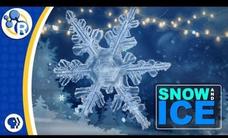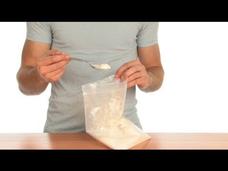Veritasium
Ice Spikes Explained
Sometimes ice freezes with spikes growing out of the top. A brief video provides a scientific explanation for this. Then, it discusses the two different possible futures if ice didn't behave this way.
National Science Foundation
Science of the Winter Olympic Games: Science of Ice
Chemistry concepts come alive against the backdrop of the Sochi Olympic Winter Games! Here is a captivating clip to share with your chemistry kids. It teaches how the bonds in a water molecule contribute to the formation of a...
Khan Academy
Boiling Point Elevation and Freezing Point Depression, Chemistry
Have you ever wondered why cities in cold climates put salt on the roads to help keep ice from forming? In this chemistry video, Sal explains why the introduction of salt molecules suppresses, or delays, the formation of ice crystals...
American Chemical Society
Why Don’t Antarctic Fish Freeze to Death?
Some fish not only survive but thrive in Antarctic waters. Learn their secret in a lesson in an informative video about the freezing point of the salty sea water as well as the antifreeze proteins in the species' circulatory system.
American Chemical Society
How to Survive the Snow and Ice
Can you tell the difference between artificial snow and the real thing? An informative video explains the structure of a snowflake crystal, both real and artificial. It finishes with a discussion of the chemistry related to salting...
American Chemical Society
How Does Salt Melt Ice?
Much like the ice on roadways, common sodium chloride has been melting away snow days for many a year! Explore the colligative property freezing point depression through an interesting video from the American Chemical Society Reactions...
American Chemical Society
Ice Cream Chemistry
Here's a sweet lesson for your ice cream lovers! Scholars explore the effect temperature and emulsifiers have on the creation of ice crystals. They see that making slight adjustments changes the consistency of ice cream by...
American Chemical Society
How is Artificial Snow Made?
It's time to take to the slopes to enjoy a little scientific exploration. Scholars learn the chemistry of artificial snow by watching an informative video. The ACS Reactions lesson describes the importance of creating the correct...
Veritasium
Celsius Didn't Invent Celsius
This temperature scale brought to you by...Carl Linnaeus? Discover the true origins of the world's most popular unit of temperature with a video from Veritasium. Content includes the world's struggle with standard temperature...
SciShow
Does Hot Water Freeze Faster Than Cold Water?
Hot water freezing faster than cold water is called the Mpemba effect. The interesting video analyzes the concept of water temperature and its effect on freezing rates. The narrator explores past experiments showing this effect and...
SciShow
How Is That Not Killing You?
Humans lose consciousness at under 5 Gs, but woodpeckers experience deceleration forces of 1200 Gs without losing consciousness. How do woodpeckers survive? Video highlights three different animal adaptations that help them to survive in...
Be Smart
There's No Such Thing As Cold
Is cold real, or just a feeling? Assist your class in discovering the truth behind the body's assumption of cold as they learn the difference between heat and temperature and why wind causes a person to feel colder. They conclude...
Crash Course Kids
Wood, Water, and Properties
Why do bricks make terrible windows? Learn about how the different properties of matter, including transparency, reflectivity, and freezing, boiling, and melting points can help you observe what they are, as well as indicate their...
TED-Ed
Under the Hood: The Chemistry of Cars
Ladies and gentlemen, start your engines! Explore the cumbustion reactions driving the world's automobiles and the chemical solutions used to keep their engines cool with this fun instructional video.
Curated OER
Sub Zero Science
Spangler invites a teacher in for this segment. She has developed some amazing demonstrations which use liquid nitrogen for elementary schoolers. She drops inflated balloons into a bowl of liquid nitrogen and the results are quite...
Steve Spangler Science
Homemade Ice Cream - Sick Science! #041
Here is the recipe for making ice cream in a couple of zip-top plastic bags. It is a fun way to demonstrate phase changes, especially when the weather is hot! Use this in your elementary science curriculum when introducing the states of...
Curated OER
Bursting Water Pipe
Water is powerful! Because it expands as it freezes, if it does so in a closed system, tremendous pressure can be created. All it takes is a little break to cause the system to explode! It's unlikely that you would submerge a pipe full...
Steve Spangler Science
Sub-Zero Science - Julie Gintzler
Spangler invites a teacher in for this segment. She has developed some amazing demonstrations which use liquid nitrogen for elementary schoolers. She drops inflated balloons into a bowl of liquid nitrogen and the results are quite...
Steve Spangler Science
Play and Freeze - Having Fun Making Ice Cream
Steve Spangler has created a toy that relies on science to make ice cream! He uses a ball with two cylinders inserted. One contains rock salt and water, while the other contains the ice cream ingredients. Once sealed, a family kicks the...
Steve Spangler Science
Instant Freeze - Soda Ice
Here is a fun display that will help your physical science fanatics understand freezing points and crystal formation. Use rock salt, sparkling water, and ice to create a -10¡C bath. Place full bottles of soda into the slurry to supercool...
Steve Spangler Science
Freezing Liquid - Cool Science Fair Project
Spangler leads an 11 year old scientist through the processes behind his science fair project, which was designed to see if any common household liquids (besides water) would expand when frozen. Liquids such as motor oil, ethanol,...
Steve Spangler Science
Bursting Water Pipe - Cool Science Demo
Water is powerful! Because it expands as it freezes, if it does so in a closed system, tremendous pressure can be created. All it takes is a little break to cause the system to explode! It's unlikely that you would submerge a pipe full...





















